'Painted Bird' star Stellan Skarsgård: 'The violence is truthful, and that’s horrible' (exclusive)
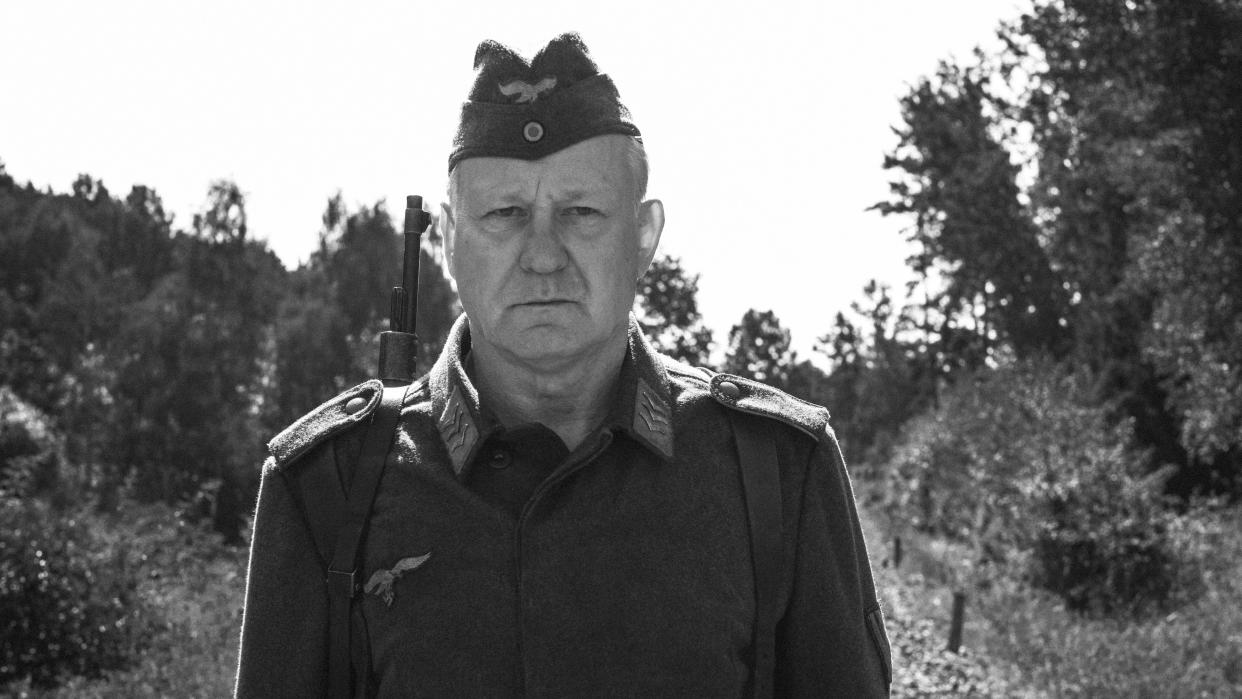
The Painted Bird star Stellan Skarsgård says media reports of walkouts at the film’s Venice premiere were overstated.
Telling the story of a Jewish boy (Petr Kotlár) during the Second World War, the three-hour epic from Czech director Václav Marhoul – adapted from the 1965 novel by Jerzy Kosiński – features brutal violence, bestiality, incest and rape.
“It is a film that some people have difficulties taking and I totally understand that,” Skarsgård told Yahoo Movies UK.
The actor appears in a brief role as Nazi soldier Hans in the monochrome epic, while other major stars such as Harvey Keitel, Udo Kier and Julian Sands also provide cameo appearances.
Read more: Stellan Skarsgård reveals lengthy Dune make-up job
Skarsgård said he saw the film at that Venice premiere, after which the director was given an 11-minute standing ovation.
He added: “It was reported as walkouts but, out of this big cinema, it was maybe 10 or 12 people who walked out and most of them came back when they had peed.”

Further walkouts were reported when the film screened at the Toronto International Film Festival, with around 40 people heading for the doors early.
Read more: New film from Babadook director causes festival walkouts
Skarsgard said the film’s horrific violence is necessary in depicting the true horrors inflicted by the Nazis during the Second World War, but said he doesn’t hold a grudge against those unwilling to take the plunge.
“It’s totally legitimate and I understand people who do not want to see it,” he said.
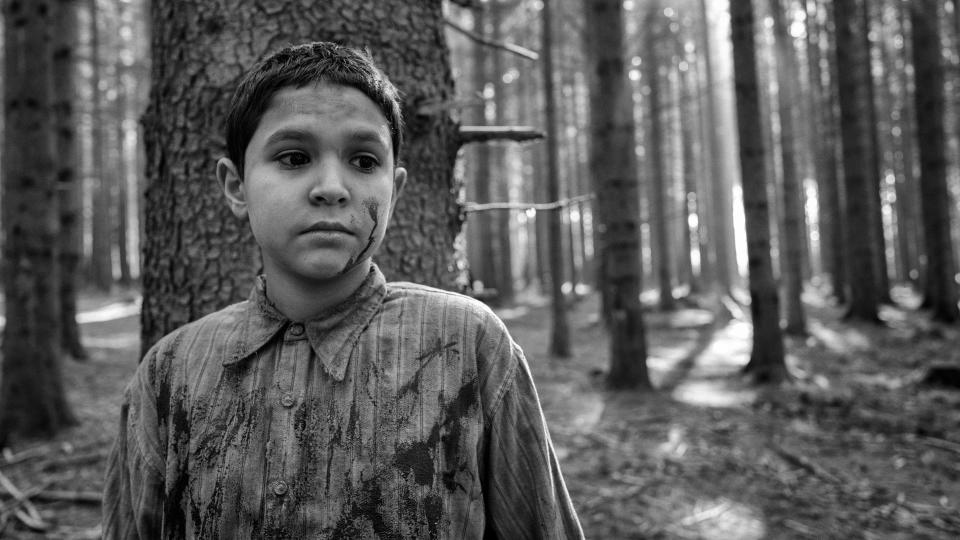
“But they have been talking about how the violence is so horrible. There’s much less violence in this film than in any American popcorn film.
“The violence is truthful – and that’s the horrible thing. Violence is not just entertaining and easily digested.
“Lars von Trier, when he did The House That Jack Built, I read a review where he was criticised because the violence was ‘unpleasant’. I was like: ‘Oh no, you couldn’t enjoy the massacres? You couldn’t enjoy the cutting up of people?’”
Read more: Lars von Trier discusses House That Jack Built walkouts
Skarsgård revealed he only asked for £100 to appear in the movie – the lowest pay packet he has ever received for a film role.
Despite the controversy, The Painted Bird has attracted rave reviews from critics and currently has an 80% approval rating on Rotten Tomatoes.
Read the full interview with Stellan Skarsgård, in which he discusses the long road to The Painted Bird, working with Lars von Trier, his future with Marvel and the joy of getting to cuddle Colin Firth on a boat...
Yahoo Movies UK: This film is a hell of an experience and there has been controversy around it, which we will talk about. But when you first saw the finished movie, what did you think of it?
Stellan Skarsgård: I was really happy because it was everything I dreamed it would become. It’s the kind of film that is barely done any more because it is definitely not done for the small screen. It’s done to be seen in a cinema and it reminds you of the great cinematic films from the 60s, where the cinematic language is what carries the film. There’s not much dialogue in it. It’s all images and they are very powerful.
It’s a real, uncompromising vision, I think. There’s no concessions. It’s nearly three hours long, it’s in black and white, as you say there’s little dialogue. It feels like someone has made the movie they set out to make, regardless of what was going to happen to it.
Definitely. The director contacted me 11 years ago, after having tried for two years to get the rights to the book, and he said he was going to write a script and turn it into a film and would I like to be a part of it. I said yes immediately, because it’s the kind of film that’s impossible to finance, but you really want it to be made.
So I signed up and then Harvey Keitel, Julian Sands, Udo Kier and other people who could bring some money to the film signed up for small roles.
I was reading in another interview that you had quite a strong connection to the book. Is that right?
Well, I have a lot of connections to a lot of books. It’s not a big part of my life, but I read it in the 60s or early 70s and I thought it was a great book, which it is. Jerzy Kosiński is a great writer. He did another film, which was totally different. That is Being There with Peter Sellers. That’s also based on a Kosiński book.
You mentioned that you first got involved 11 years ago. What was it that finally got the film over the line?
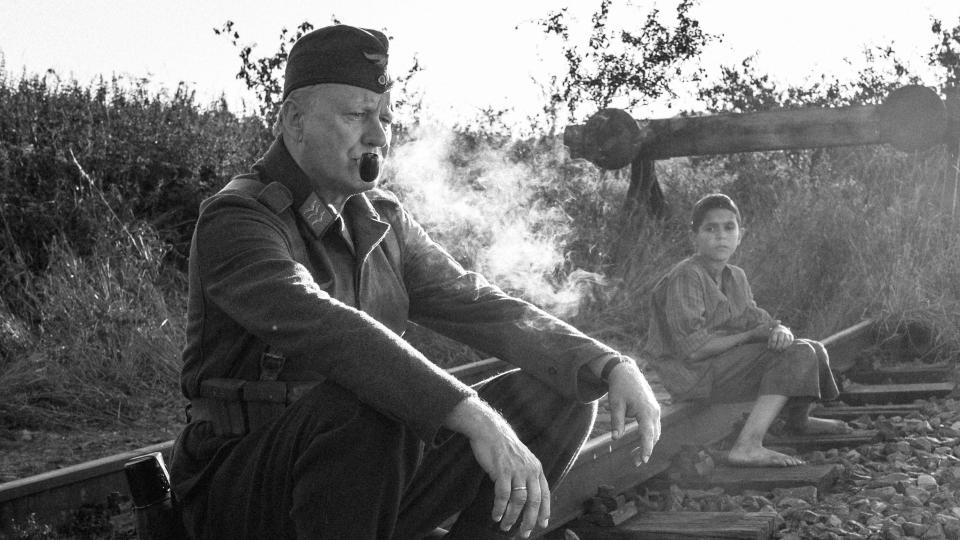
As you can see from the film, he knew what he wanted to do and he did not want to give up. He fought for it for 15 years, I think, in total. Of course, some of the names he got on the film could attract some money and then, of course, the quality of the material attracted some people. Everyone involved knew they wouldn’t be rich from it – even the producers. Then all of the local European funding and stuff like that.
He also wanted to shoot it over two years, in black and white and with a boy that was growing throughout the shoot. That was, of course, extremely complicated and expensive. I told my agent there would come an offer from Czechia and I want you to negotiate it to exactly £100. It’s the least money I’ve taken for a film ever. So we all chipped in in different ways.
You mentioned the young star there [Petr Kotlár]. What was it like to work with him and how difficult was it for him, given the many demands on him as a young actor?
I was there for two days and I just saw his face and thought he was fantastic in what he did. Then I saw the film and he is unbelievably truthful and moving and everything. But physically, it must have been extremely hard for him. I asked him and he said that he was fine with it. He didn’t say he was traumatised by it.
Obviously the atmosphere of the film is so intense. Did that intensity come through on set?
No, and it usually doesn’t. I’ve done a lot of strange and dark films and usually you have a lot of fun on the set. At least I have fun, otherwise I don’t think I can work. It’s fun making dark films too. Make-believe.
Do you have more fun on a film like this, or when you’re cuddling Colin Firth on a boat?
Cuddling Colin Firth on a boat is not even acting. It’s just making sure that you have fun. The audience experiences that you are enjoying yourself and gets bitten by it, so that was much less acting.
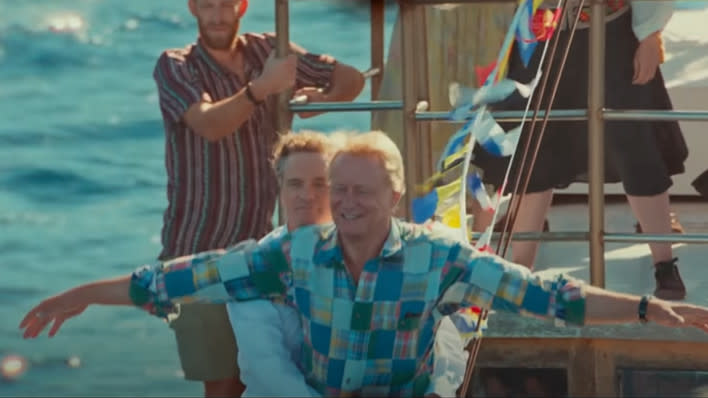
You mentioned your strange, dark roles there and, of course, you’ve worked with Lars von Trier a number of times. How did working with Marhoul on The Painted Bird compare to working with Von Trier?
Well they have very different techniques. Václav has very designed images, which means that you have to fit into those images because the images are doing the talking. In a Lars von Trier film, you have total freedom in front of the camera and you can do exactly whatever you want and he will pick out what he needs.
So Marhoul’s approach was very forensic and planned out?
It was very planned out and sometimes almost stylised in the acting, which is a different thing for me.
Is it difficult for you to put together a complete character knowing you only have a couple of days on the set?
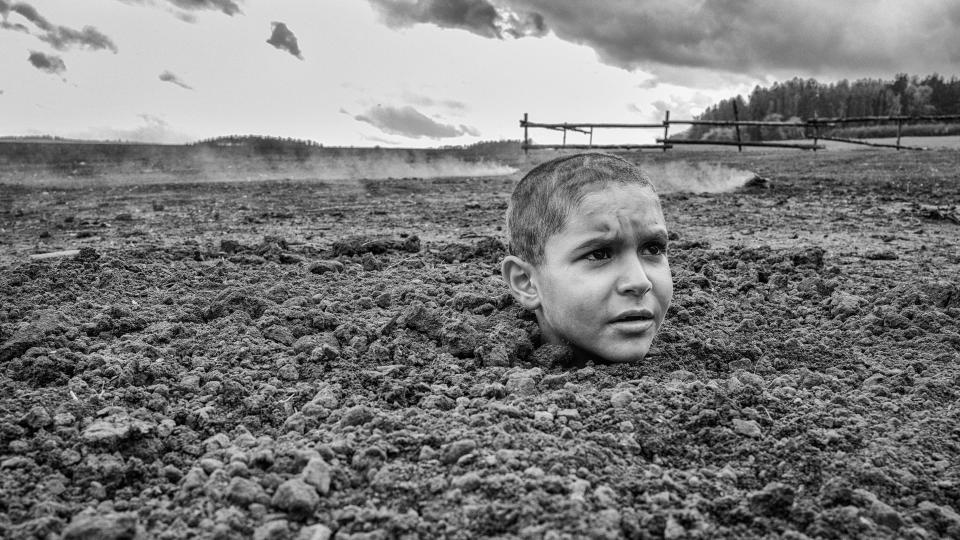
Of course it is. You know you can’t. Not even in an hour-and-a-half leading role can you really portray a human being. But you can show different sides at least if you have a leading role. What you have to concentrate on is to have a presence with some weight and human feelings.
I’m intrigued to ask about the film playing on the festival circuit. There were widely reported walkouts. Were you there for any of those screenings?
That’s the wonderful thing about media – you have to find something to write about, so you write about the walkouts. I’ve only seen it once and that was in Venice, at the festival. It was reported as walkouts but, out of this big cinema, it was maybe 10 or 12 people who walked out and most of them came back when they had peed.
But of course it is a film that some people have difficulties taking and I totally understand that. I don’t have a problem sitting through it, but I have a brother who can’t see any film where you feel sorry for anybody.
That’s a lot of films!
It takes away a lot. It’s like 90% of films in the world he can’t see because he’s so vulnerable to the power of the story.
So it’s totally legitimate and I understand people who do not want to see it. But they have been talking about how the violence is so horrible. There’s much less violence in this film than in any American popcorn film. But the violence is truthful – and that’s the horrible thing. Violence is not just entertaining and easily digested.
Lars von Trier, when he did The House That Jack Built, I read a review where he was criticised because the violence was “unpleasant”. I was like: “Oh no, you couldn’t enjoy the massacres? You couldn’t enjoy the cutting up of people?”

You mentioned media narratives there. Do you think those narratives can help the film? Ultimately, people might go to see it because of that notoriety.
I don’t care why people see it. I think that the film is strong enough to survive any preconceived ideas about it, so it doesn’t matter. I hope people see it. If they like cinema, it really is true cinema. It’s an extremely beautiful film, but brutal.
I guess that’s the difference with someone like Von Trier. He obviously seems to relish the controversy around his films and uses that to push them.
Well, to a certain extent. He told me once: “Stellan, I’ve figured out what the films are that I’m doing. I’m doing all the films that haven’t been made.” He just wants to do films that haven’t been made, and that’s a very good thing because most films that you see have already been made.
Away from the controversy, are you happy in general with the way the film has been received?
Yes, it has got fantastic reviews. It was wonderful to see Václav Marhoul in Venice, after having worked on this project relentlessly for 15 years, get an 11-minute standing ovation. To watch his face at that moment was fantastic.
Where do you see this film sitting in terms of Second World War films in general? As it happens, I saw Come And See recently and the comparisons between that and The Painted Bird are very strong.
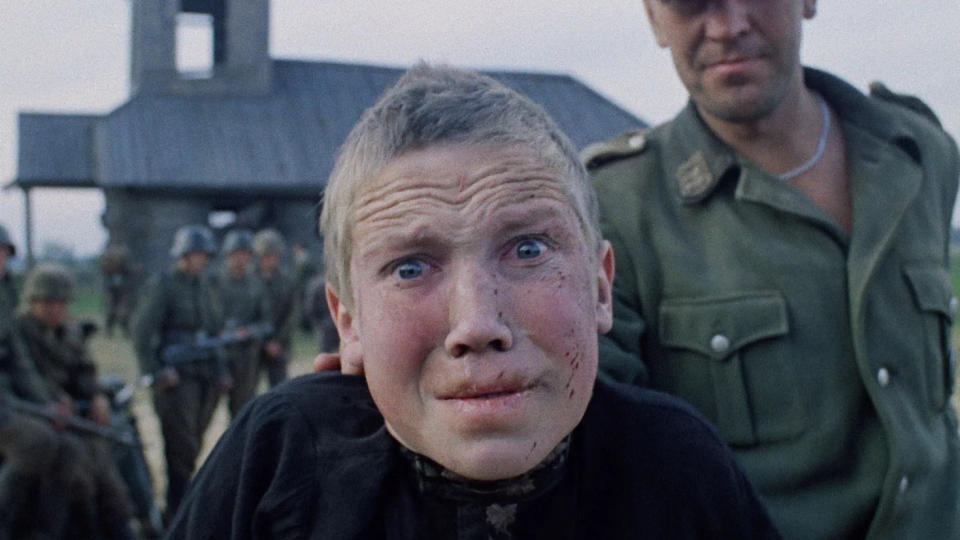
That’s one of my favourite films. Did you know that Aleksey Kravchenko, who plays the boy in that film, also has a part in this one? I met him for the first time in Venice and, for once, I was a little starstruck. Come And See is a fantastic film and it’s definitely one of the best Second World War films ever made. I can’t think of any better.
Throughout your career, you’ve really balanced Hollywood movies with smaller films and European projects. Is that a conscious choice to keep a balance?
Definitely, but it’s not as part of a big scheme or plan. It’s just that once I’ve done a film like Mamma Mia, it’s really nice to go and do a film like Painted Bird and once I’ve done something like a Trier film, it’s nice to go and do a Marvel film. I want a lot of dishes on my Swedish smorgasbord in front of me.
But of course it also helps because, if there’s a small film like this that is going to be financed, the bankers look at my name and check on how much my films have made in the last year. They see over a billion dollars, so that’s a good investment, they think. They don’t understand that it has nothing to do with me, but they finance a small film based on it.
We’ve mentioned Mamma Mia a couple of times. If they were to do another film, would you want to come back?
Yes. If it’s even only decently a good script, I would come back. With both of those films, it was such a joy doing them with a bunch of really good actors.
And you might get to cuddle Colin again, which is always a good thing.
It’s always a good thing to cuddle Colin.
We mentioned Marvel too. As far as you know, is there a chance we’ll see Erik Selvig again?
I don’t know. You’ve got to ask Kevin Feige about that. I’ve done four films for them. I don’t know if they killed me? I haven’t followed that up. They might have. Everything is possible in those films.
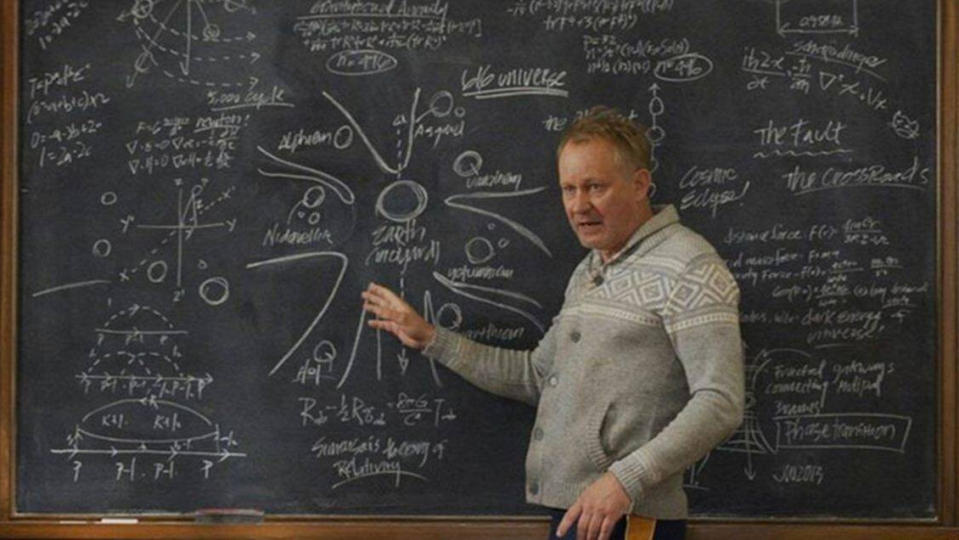
Did you sign for a certain number of films?
They had an option for five films, but that option has sort of run out. They don’t own me.
But if you were offered the chance?
Yes, it would be fun. I would do it. I’ve enjoyed the four I’ve done so far, so I would do that. If they can afford me.
So Painted Bird is coming out and you’ve finished with Dune. What’s next for you?
I was supposed to do a film written by my wife. It’s a Chinese-produced and -directed film in Finland. But they had virus problems. It would be horrible for the entire cinema industry if nobody goes to the cinemas. A lot of companies have gone down in China and so the financing just disappeared. The survivors from this will just be the big companies that are already rich.
The Painted Bird is in UK and Irish cinemas and on digital from 11 September.

 Yahoo Movies
Yahoo Movies 
